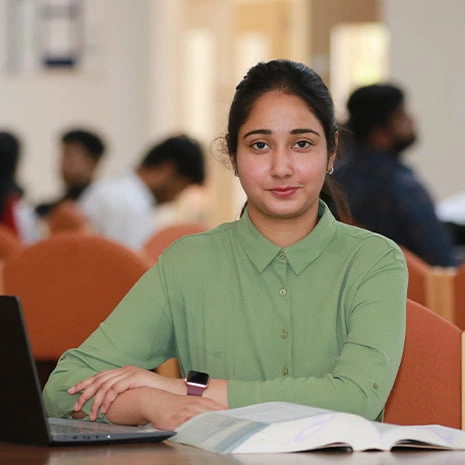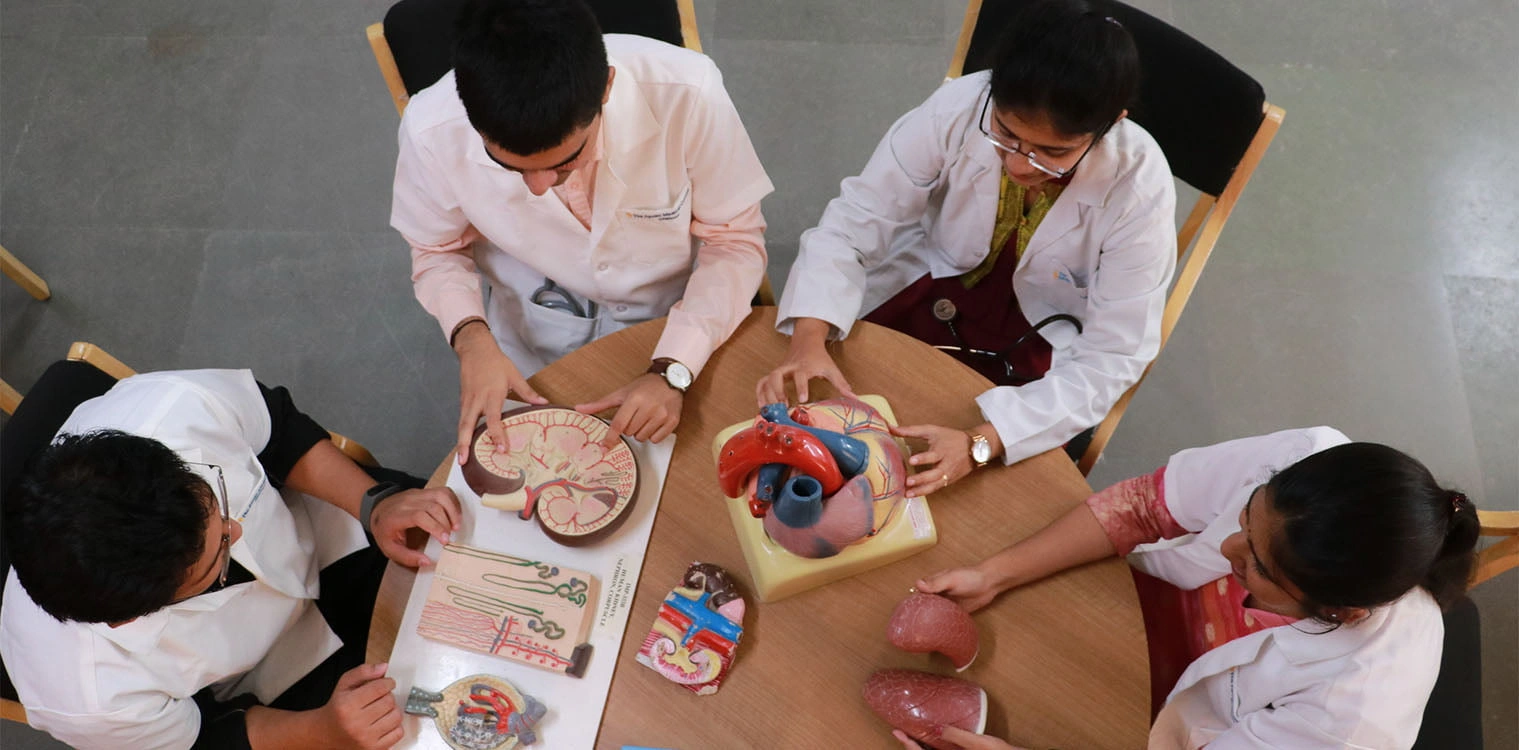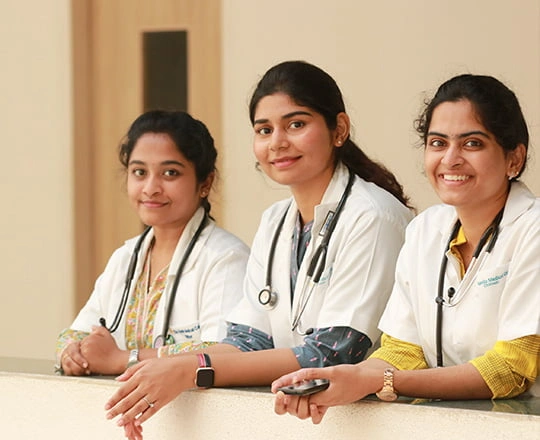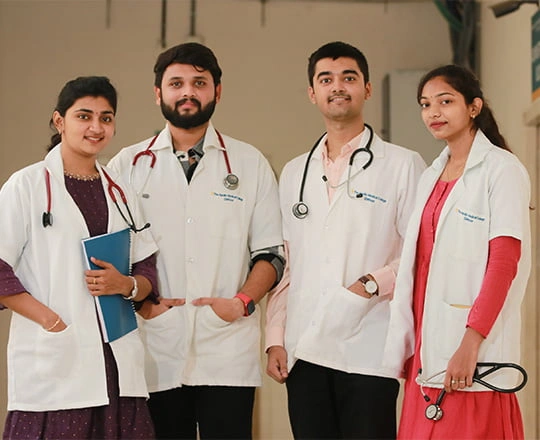COURSE OVERVIEW

The B.Sc. in Medical Laboratory Technology at The Apollo University is a 4-year undergraduate allied health programme, divided into six semesters and one year of internship. It provides practical and theoretical knowledge on diagnosing, treating, and preventing various diseases and health problems using clinical laboratory tests.
Throughout the programme, students perform diverse and multi-level functions in collecting, processing, and analysing biological specimens and other substances, as well as in applying principles and methodologies, conducting assays, and using problem-solving and troubleshooting techniques. They also learn to correlate clinical procedures and results, and understand the principles and practices of quality assessment across key areas such as clinical chemistry, haematology, microbiology, immunology, blood banking, cytology, and molecular biology in contemporary clinical laboratories.
Programme Objectives
At the completion of the B.Sc. MLT programme, students will be able to:
- To provide a comprehensive knowledge to the students with respect to various
techniques of testing that are conducted as a part of diagnosis of various diseases - To train the students to carry out laboratory investigations accurately and provide
reliable reports to facilitate proper diagnosis and prognosis of diseases. - To enable to perform routine as well as special investigative procedures in different
specialties of Medical Laboratory Technology. - Communicate effectively with laboratory personnel, other health care professionals, patients and the public.
Programme HIGHLIGHTS
Following are the key features of the B.Sc. Medical Lab Technology programme at The Apollo University:

Programme Curriculum
- Year 1 + -
- Semester I: Human anatomy, Physiology, Biochemistry, English (university core), University elective
- Semester II: Microbiology, Pathology, Pharmacology, Clinical laboratory practice, Environmental science (university core), University elective
- Year 2 + -
- Semester III: General Biochemistry, General Microbiology and Immunology, General Pathology, University core, University elective
- Semester IV: General laboratory techniques and procedures (biochemistry), systemic bacteriology, systemic pathology, Community medicine
- Year 3 + -
- Semester V:
- Semester VI:
Internship in Apollo Hospitals Group and Apollo Diagnostic Centres
PROGRAMME FEE AND SCHOLARSHIPS
| One-Time Fee | Admission Fee | ₹ 7,000 |
| 1st Year | Tuition Fee + Annual Recurring Fee | ₹ 1,30,000 + ₹ 13,000 |
| 2nd Year | Tuition Fee + Annual Recurring Fee | ₹ 1,30,000 + ₹ 13,000 |
| 3rd Year | Tuition Fee + Annual Recurring Fee | ₹ 1,30,000 + ₹ 13,000 |
| 4th Year | Tuition Fee + Annual Recurring Fee | ₹ 1,30,000 + ₹ 13,000 |
| Total Course Fee | ₹ 5,79,000 |
Scholarship is available for eligible students
Eligibility
Passed with at least 45% (40% in case the candidates belong to reserved category) marks with Botany, Zoology, Physics and Chemistry or Inter vocational with Bridge course of Biological and Physical Sciences (or) APOSS with Biological Sciences and Physical Sciences from a recognized board or other equivalent board or Intermediate and attain 17 Years as on 31st December of Calendar Year.
Lateral Entry
| Total Course Duration | You Will Join In | Seats Available | Education Qualification |
|---|---|---|---|
| 4 Years | 2nd Year | 10 | Passed with at least 45% (40% in case the candidates belong to reserved category) marks with Botany, Zoology, Physics and Chemistry or Inter vocational with Bridge course of Biological and Physical Sciences (or) APOSS with Biological Sciences and Physical Sciences from a recognised board or other equivalent board or Intermediate and attain 17 Years as on 31st December of Calendar Year. |
EMPLOYABILITY AREAS
Given the focus on the healthcare and the demand for allied health professionals, career opportunities for clinical lab professionals are expected to grow faster than the average of all other occupations.

- Scientific: Work as a Laboratory Technologist at Hospitals and Diagnostic Centres, Pharmaceutical Laboratories, Public Health Laboratories, Research & Product Development
- Managerial: Supervisor in Laboratory, as a Consultant to the Laboratory Medicine Industry, Quality Assurance Companies, Sales & Marketing
- Educational: As a Tutor in the Laboratory Medicine Graduate Programme
FAQs
-
Why The Apollo University is the best place for B.Sc. Medical Laboratory Technology course?
+ -The Apollo University is a strong choice for students who want to do a B.Sc. Medical Laboratory Technology due to its focus on hands-on training, well-rounded curriculum and industry connections. This helps learners to prepare for diverse career paths.
-
What is the duration of the B.Sc. MLT course at The Apollo University?
+ -The duration of the B.Sc. MLT programme is a 4-year, which is divided into six semesters along with one year of internship.
-
Are scholarships available for B.Sc. MLT students at The Apollo University?
+ -Yes, scholarships for B.Sc. MLT programme are available for eligible students at The Apollo University.
-
What is the admission process for B.Sc. MLT at The Apollo University?
+ -The admission process for B.Sc. MLT at The Apollo University involves several steps, including registration, email verification, online application submission, payment of the registration fee and submission of the application.
-
What is the scope of B.Sc. medical laboratory technology?
+ -The scope of B.Sc. Medical Laboratory Technology is broad, encompassing a diverse range of job roles in the healthcare industry. It includes job positions in hospitals, diagnostic centres and research facilities.
-
Is B.Sc. MLT a good course?
+ -Absolutely, a B.Sc. MLT is considered an excellent course for individuals seeking to build a career in the healthcare field and diagnostics. The course offers good career prospects, several job opportunities and a chance to contribute to patient care.
-
Which is better, a B.Sc. Nursing or B.Sc. MLT?
+ -Both B.Sc. Nursing or B.Sc. MLT are an excellent choice for a successful healthcare career, but the “choice” depends on your interest and career goals.
-
What is the salary after doing a B.Sc. MLT?
+ -A graduate in B.Sc. MLT can expect a salary range of between ₹2.4 LPA to ₹4.8 LPA in India, depending on experience, location and employer.
-
Does B.Sc. MLT require NEET?
+ -No, the NEET exam is not required for admission to a B.Sc. programme in India.
-
Is B.Sc. MLT a good career option?
+ -B.Sc. MLT is considered an excellent career option for students as it offers job stability, a variety of career paths and opportunities for specialisation and advancement.



